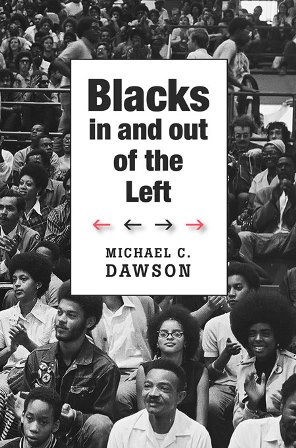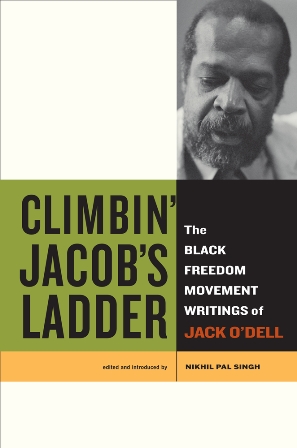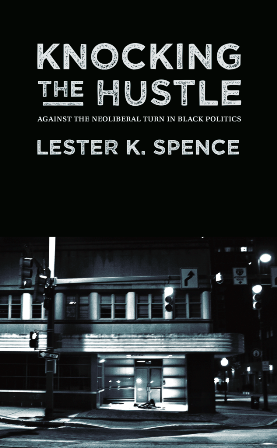How should we define the black freedom movement? Some have argued that the very idea of a “long black freedom struggle” obscures specific political investments and programs, including ideological, class, and gender differences that divided black social movements and fractured black communal aspirations, particularly in the post-civil rights period. A related charge is that a narrow focus on racial disparity now monopolizes the field of antiracist politics, obscuring the class basis of racial oppression behind mystifying slogans of (nonexistent) racial unity.1The oeuvre of Adolph Reed Jr. is most notable. See for example, “The Limits of Anti-Racism” (2009), among many other essays. On this point, I am also indebted to exchanges with Cedric Johnson and Keeanga-Yamahtta Taylor. The writings of activist and intellectual Jack O’Dell envisioned the black freedom movement within a long arc of capitalist development and colonial domination. Revisiting his essays engages questions about how to understand the movement’s scope, the terms we use to tell its stories, and qualitative assessments of its successes and failures that shape our understanding of its political significance and contemporary relevance.
The aspect of this debate that concerns me most is how we should understand the historical and contemporary relationship of struggles defined around black interests or “black lives,” and the struggle for social democracy or socialism.2In other words, the struggles against racial domination and struggles against the injuries of capitalism and social class. Even if a version of antiracism has been folded into an upwardly mobile politics of elite representation and diversification in recent years, attention to the specifically racial dimensions of injustice (in the United States, and in the world at large) does not support the conviction that we can achieve justice under capitalism. Looked at in historical terms, we might say the opposite is true. Periods of organized anticapitalist politics in the United States, however limited, emerged in a tight rapprochement with the primacy of struggles on a racialized terrain and were characterized by direct confrontations with entrenched white supremacy.
“In line with historical uses of racial division to drive a wedge between groups of workers, owners of capital made use of both whites-only policies and solicitude toward black labor to disrupt labor unity.”The relationship between blacks and varied currents of the American left, however, has not been seamless or uncontentious. As Michael Dawson has shown, across the twentieth-century there has been consistent movement of blacks “in and out of the left” precisely around the tactical and theoretical priorities afforded to struggles against racism and colonialism within various organizations.3 Cambridge: Harvard University Press, 2013More Info → In line with historical uses of racial division to drive a wedge between groups of workers, owners of capital made use of both whites-only policies and solicitude toward black labor to disrupt labor unity.4Exceptional periods and organizing efforts notwithstanding, the main historical currents of organized labor in the United States in turn, defended a privileged association between whiteness and wages, including defenses of occupational hierarchies and neighborhood boundaries. Against these currents, black political perspective and organization developed as an independent dimension of the American political landscape, irreducible to pluralist-interest group politics, and based upon identifying and opposing sanctioned racial violence and exclusion as durable and systemic features of US social, political, and economic ordering.
Cambridge: Harvard University Press, 2013More Info → In line with historical uses of racial division to drive a wedge between groups of workers, owners of capital made use of both whites-only policies and solicitude toward black labor to disrupt labor unity.4Exceptional periods and organizing efforts notwithstanding, the main historical currents of organized labor in the United States in turn, defended a privileged association between whiteness and wages, including defenses of occupational hierarchies and neighborhood boundaries. Against these currents, black political perspective and organization developed as an independent dimension of the American political landscape, irreducible to pluralist-interest group politics, and based upon identifying and opposing sanctioned racial violence and exclusion as durable and systemic features of US social, political, and economic ordering.
O’Dell and the black freedom movement
A product of the Congress of Industrial Organizations (CIO)5The CIO (1935–1955) was one of the few labor organizations that, at the time, allowed black Americans to join. It later rejoined the American Federation of Labor (AFL) to form the current AFL-CIO. social movement and the mid-century period of labor and left militancy, a victim of the Cold War’s anticommunist purge, and someone who developed his most important body of intellectual work from a radical political perspective from within the civil rights movement, the writings of Jack O’Dell provide important, if neglected, insight into how to understand inextricable aspects of race and class domination. His writings also resituate an analysis of racism in relationship to a broader framework of imperial and colonial state violence. O’Dell is one of the best historical examples of an organic intellectual of the black freedom movement whose commitment to communism was forged in opposition to racial domination. The course of his life-long activism also illustrates the effort within the state security apparatus to sever the emerging black freedom movement of the 1950s and 1960s from any lingering socialist and communist influence. Called before Mississippi senator James Eastland’s Senate Internal Security Subcommittee in 1956, O’Dell named its members avatars of white supremacy, and asked the Senate’s lead counsel if he was “some kind of dictator.” When the committee alleged that his civil rights activity was a front for communist conspiracy, O’Dell responded: “The Jim Crow system is not a front… if you think it is a front you’ve got a great deal to learn about your own country.”6John Munro, “Imperial Anti-Communism and the African American Freedom Movement in the Early Cold War,” History Workshop Journal 79, no. 1 (2015): 52–75.
When he became part of the inner circle around Martin Luther King, Jr. a few years later, FBI counter-intelligence accessed the highest reaches of the Kennedy Administration to make certain he was expelled. As editor of the journal Freedomways, O’Dell wrote a series of important essays in the mid-1960s that attempt to outline a comprehensive radical perspective on the politics of racial domination. The first, “Foundations of Racism in American Life” (1964), theorizes racism as a durable, ideological component of US historical development across three centuries. O’Dell’s main argument is that slavery, intertwined with westward expansion, gave a definitive cast to American capitalism across time.
Despite military defeat in the Civil War, and the brief, glittering promise of “Reconstruction democracy,” by the dawn of the twentieth century, the political institutions, economic practices, martial traditions, and cultural norms of a “Southern way of life” contributed to the formation of a “state system of racism” that was widely dispersed across institutional, academic, and policy spheres. A striking feature of this essay is O’Dell’s recognition that, despite its national and global reach, racial despotism developed in regionally and institutionally variegated ways as it was incorporated into regimes of labor exploitation and land theft that ensued from histories of African slavery, Indian removal, and the conquest of Mexican territory. “What must be exploded,” he writes, “is the national myth that the dominant ideology in America has always been freedom and equality, while racism has been some unfortunate departure from the norm.”7 University of California Press, 2010More Info →
University of California Press, 2010More Info →
For O’Dell, grasping the depth, durability, and variability of racial domination was one of the keys to unraveling the injustices of American capitalism. Modern civil rights struggles, he cautioned, faced political forces intent upon reanimating and renewing racist foundations. He put forth this argument in an essay the following year, “The Threshold of a New Reconstruction” (1965). Here, he observed that the landmark passage of the Civil Rights and Voting Rights Acts had only “created the conditions for fundamental changes.” Legal victories, he argued, would not alter the relations of force or prevailing public morality at regional, state, and local levels that were still heavily invested in the disfranchisement and devaluation of black citizens. Black communities, he observed, remained particularly vulnerable to superexploitation and extrajudicial terror. This observation, he noted, had started to push younger militants into separatist postures behind the slogan “black power.” Writing against this current, O’Dell insisted that the only effective answer to racial domination was a broad-based movement capable of achieving the social, economic, and political reconstruction of the nation-state as a whole. “Ours has never been a struggle of black against white,” he concluded, “It is the struggle of the unrepresented against an oligarchy of despotism.”8Climbin’ Jacob’s Ladder, pp. 110–124.
Colonial parallels
“The defeat of Reconstruction after the Civil War presaged the development and integration of colonial relationships at a world scale, justified through a ‘vast superstructure of racist culture.’”Importantly, O’Dell refused to limit this perspective to the national scale. In a series of essays, “Colonialism and the Negro Experience” (1966) and “A Special Variety of Colonialism” (1967), he called for a comparative analysis of the struggles against racism and colonialism. This would not proceed on the basis of shared “bonds of color,” but through an understanding of shared institutional mechanisms and histories that engineered similar forms of uneven economic development, unequal social status, and states of indignity, dispossession, and disposability. The defining contradiction of US history, in this view, was that the world’s first expressly anticolonial revolution preserved and augmented “a variety of colonialism” internally, in the form of slavery and westward expansion. Viewed from this wider perspective, the defeat of Reconstruction after the Civil War presaged the development and integration of colonial relationships at a world scale, justified through a “vast superstructure of racist culture.” The struggles against colonialism unleashed by World War II, in turn, marked the beginning of a “new period in world behavior.” Black struggles inside the United States were a fundamental part of this transition and had made important contributions to it.9Ibid., pp. 124–145.
Following the wave of “rebellions” in black urban areas in the summer of 1967, O’Dell published one of his most pessimistic essays, one that brought his sweeping historical sensibility fully into the contemporary context. “The July Rebellions and the Military State” (1967) presented a studied refusal of an official lexicon that described these events as the actions of criminal mobs, or even as riots. Instead, O’Dell placed them in the trajectory of slave revolts, arguing that the modern ghetto was the latest institutional manifestation of black confinement that began on the plantation. He rejected the idea that black leadership must “disassociate itself from… ghetto rebellion,” countering that it was essential to grasp the political and economic conditions of black urban existence as the ground of a new period of struggle. Drawing upon another historical reference, he compared ghetto conditions of chronic “unemployment and marginal employment,” to the Great Depression of the 1930s, suggesting that the paradigmatic instance of global, working-class crisis was recast inside the United States in racialized and uneven forms. Black poverty illuminated the central contradiction of colonial and racial capitalism left unresolved by the so-called affluent society.
“Black struggles, in this view, had breached the limits of a system for which ‘dehumanizing poverty’ was both endemic and irreducible.”Rather than predicting the eventual incorporation of blacks into an expanding welfare state, O’Dell envisioned a more ominous situation emerging. “Policemanship as a style of government,” he writes, “is no longer confined to the southern way of life but is now becoming institutionalized at a national level.” Black struggles, in this view, had breached the limits of a system for which “dehumanizing poverty” was both endemic and irreducible. The official response appeared to be to militarize governance both domestically and globally, that is, to move toward what he termed the “Military State.”10“The road which leads from the ‘Indian massacres’ of the last century, to the Pentagon and another from the oppressive slave plantation to the ghetto are the major conjunctive highways running through the very center of US life and history,” wrote O’Dell. The political challenge remained: to build a broad-based resistance movement comprised of labor, youth, civil rights, and peace forces with the scope and durability to confront “the tyranny of racism-militarism.”11Ibid., pp. 145–160.
In many ways, looking back from the current moment, the breadth and clarity of O’Dell’s concerns are unsurpassed. Nowhere in these writings do we see any ambivalent choosing between a black or left commitment. Rather, direct political confrontation with harm lived and felt through a prism of de facto and de jure racial ascription was at its heart a confrontation with a more broadly applicable coercive authority and material deprivation. This is arguably what King meant when he claimed in the year he died that the black freedom struggle was more than a struggle for “the rights of Negroes,” but a primary avenue of democratic contention against America’s “interrelated flaws… racism, materialism and militarism.” The struggle for black freedom was neither a bourgeois conceit, nor continuous through time. To borrow political theorist Sheldon Wolin’s term, it was fugitive, always at risk of division and defeat, and thus in certain ways fleeting, because of the genuinely socially transformative nature of what its success would entail.
O’Dell in the present
Has this legacy and conception of the black freedom movement outlived its usefulness? There is a tendency on the US left today that suggests this history, and the critical discussions of race it engendered, no longer informs politics in any meaningful way. Counseling a turn to “class” and opposition to “identity politics,” it sometimes frames race as a secondary oppression, and imagines the “whiteness” of so-called white workers as given and something that can be effectively neutralized through appeals to common working-class interests. This kind of approach rests upon an un-interrogated and simplified view of racism as attitudinal rather than structured and thickly lived out in existing social (non)relationship.
“Perhaps the answer to this is not to diminish but to revive a politically robust antiracism of the kind O’Dell argued for, grounded in the history of US capitalism and empire.”In this way, as O’Dell recognized, the centrist and right-wing politics that embraced “law and order” discourse beginning in the 1960s, understood far better how to leverage racially invidious appeals in collective politics, and in defense of structural forms of race, class, and gendered violence and inequality. If opposition to racial disparity has become a narrow, meliorist pursuit, this is in no small measure because broader left weakness and division abandoned the field to liberal reformers who today sometimes opportunistically leverage antiracism against efforts to revive socialist politics. Perhaps the answer to this is not to diminish but to revive a politically robust antiracism of the kind O’Dell argued for, grounded in the history of US capitalism and empire.
Rather than imagining a return to class, in which struggles against racism are passively along for the ride, perhaps periodically reinvented black freedom struggles in the United States, including those today that constellate around the open-ended claim that “black lives matter,” continue to provide intellectual resources and cognitive maps we need to find our way—at least in the United States—to an even minimally social democratic agenda and nonracist collective politics. There has never been a period in which US capitalism has not been twinned with racial domination. If it is necessary to confront what Lester Spence calls “the neo-liberal turn” in black politics today (a challenge we should take seriously), this does not imply default to the conventional race blindness of Western radicalism, but a deeper thinking through of the historical basis and strategic fault lines of racial capitalism that was the provenance of black radicals like Jack O’Dell.12 Punctum Books, 2015More Info →
Punctum Books, 2015More Info →
Parts of this essay are adapted from Climbin’ Jacob’s Ladder: The Black Freedom Movement Writings of Jack O’Dell, edited and introduced by Nikhil Pal Singh (University of California Press, 2010).














Comments are closed.